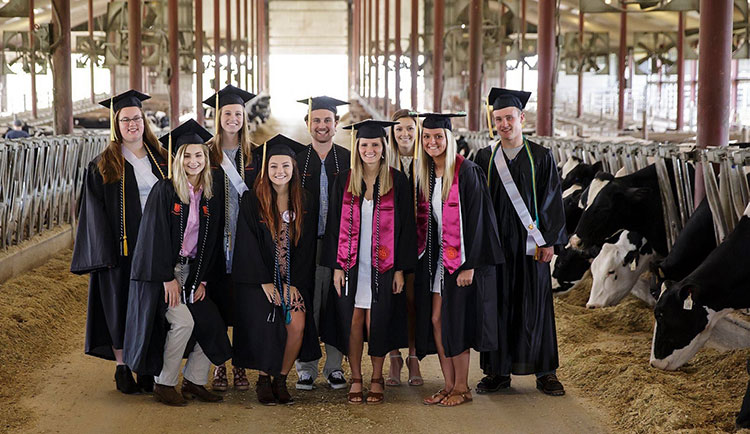
Each year, thousands of students enthusiastic about the livestock, agronomy, science, environmental resources, communication, engineering, and many other fields that play a role in producing and distributing food finish their education and begin finding their place in the workforce. Fortunately for them, a wide array of career options awaits.
Already, more than 19 million jobs are directly tied to agricultural production, manufacturing, wholesaling, and retailing. Add in the impact from suppliers and supporters — jobs in areas like construction, transportation, finance, and government — and that number swells to over 40 million. Nearly 20% of U.S. economic activity stems from the food and agriculture industries. In 2020, that added up to roughly $7 trillion.
Purdue University partnered with USDA’s National Institute of Food and Agriculture to study the future job opportunities for agricultural graduates, and the numbers remain promising. Between 2020 and 2025, they estimate that there will be 59,400 job openings in the food, agriculture, natural resources, and environmental fields every year.
Employer demand for students trained in these disciplines is even expected to exceed the number of graduates. The majority of jobs will be filled by agriculture and food graduates, with the rest by students in allied fields like biology, engineering, and journalism.
Here are the four major categories where the researchers expect new college graduates to have the most opportunities in agriculture and environmental jobs, as well as examples of careers predicted to be in demand.
Management and business: 24,700 projected job openings each year
- Lenders, credit analysts, financial managers, and advisers
- Technical sales and service specialists
- Data scientists and analysts
- Marketing and e-commerce professionals
- Trades
- Parks and recreation specialists
Science and engineering: 18,400 projected job openings each year
- Food scientists and nutritionists
- Large animal veterinarians
- Environmental specialists
- Biochemists, research biologists, microbiologists, and geneticists
- Artificial intelligence, automation, and precision technology experts
- Epidemiologists
Education, communication, and government: 8,400 projected job openings each year
- Middle and high school agriscience and natural resources teachers
- Agricultural faculty, especially at junior and community colleges
- Extension educators
- Agricultural communications professionals, especially in digital and social media
- Small business specialists
- Data analysts
Food and biomaterials production: 7,900 projected job openings each year
- Livestock managers
- Agronomists, horticulturalists, and crop scientists
- Plant, soil, and weed scientists
- Organic, local, and niche food producers
- Biomaterials and bioenergy manufacturers and engineers
- Urban agriculture developers and leaders
Some of these jobs might fall outside of what we traditionally think of as agriculture, but they illustrate how broad the field is and how many talented individuals it takes to produce food while taking care of our environmental resources efficiently. If you want to be part of an industry that affects every person in the world, agriculture can be a great fit for wherever your passions lie!

Katelyn Allen joined the Hoard’s Dairyman team as the Publications Editor in August 2019 and is now an associate editor. Katelyn is a 2019 graduate of Virginia Tech, where she majored in dairy science and minored in communication. Katelyn grew up on her family’s registered Holstein dairy, Glen-Toctin Farm, in Jefferson, Md.








